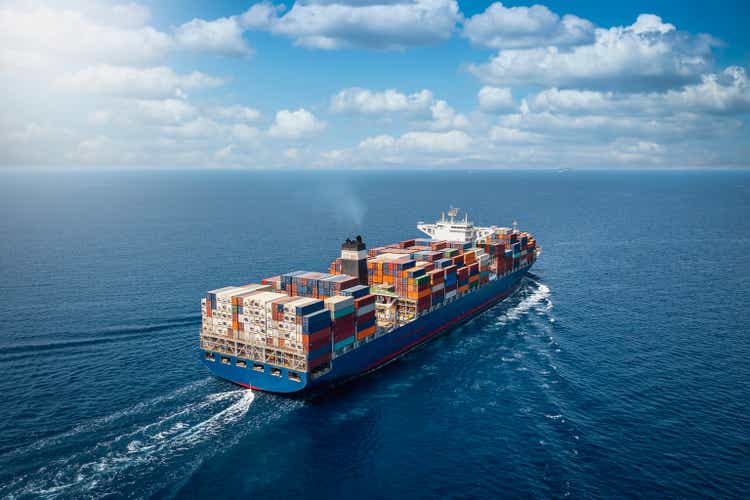SHansche
What is the proper way to value a shipping company that has a lot of debt, such as Navios Maritime Partners L.P. (NYSE:NMM)? Even if the debt is currently fully covered by the value of the ships, the ship values will depreciate with time, while the debt will not. So NMM now has a dilemma: should it sell all its ships now and distribute the net vessel equity (NMM has $2.9B of it, according to the Q3 earnings presentation) to the shareholders, which would amount to $96 per share. Or, should it hold its ships for a little longer in the hopes of making more money per year from the ships than the value loss of the total fleet per year? If NMM can make per year exactly as much money in earnings as the fleet is losing per year, then its fair value will remain at $96/share.
NMM currently has 185 ships with $5B in value, which means that the average ship is now worth around $27M. The average fleet age is 10 years. The latest Compass Maritime Weekly Report (as of November 18, 2022) shows on page 3 that a 10-year-old Capesize ship on average can be sold for $30M, while a 20-year-old ship can be sold for $15M. So if NMM keeps its current ships for another 10 years, the ships will be losing an average of ($30M – $15M)/10 = $1.5M per year. So for all its 185 ships, NMM will be losing around 185*1.5M = $278M per year.
The Nasdaq website is currently reporting a prediction of $19.76 EPS for NMM in 2023, which translates into $19.76*(30M shares) = $592M. For 2024, the EPS prediction is $18.63. These numbers are very likely much lower than what NMM will actually earn, given that the tanker spot rates have doubled since the end of Q3 and are still on a tear, as the charts in this article show. Besides, the dry bulk spot rates are at a rock bottom right now and can only move up from here (and they will INEVITABLY move up because the new order book is one of the lowest on record, as slide 31 in NMM’s Q3 Earnings presentation shows).
In any case, over the next 2 years NMM will make much more per year than its ships will lose in value, and so NMM is doing the right thing by not selling its ships. We also conclude that NMM’s true value is actually more than $96/share because if it completely stops paying out dividends and just accumulates earnings on its balance sheet, its value would be growing by ($592M – $278M)/(30M shares) ~= $10 per share every year. How much would you pay for a company that could liquidate itself for $96 right now or potentially liquidate N years later for $96 + N*$10?
One may say that NMM’s CEO Angeliki Frangou (AF) keeps increasing the fleet size by buying new ships instead of reducing it by selling old ships, and so the net vessel equity will never affect the share price. The interesting thing is that with the net vessel equity of $2.9B and huge earnings for the foreseeable future, AF can BOTH increase the fleet size AND move up the share price. During the summer AF had announced a plan to buy back $100M worth of company stock, which would turn a fraction of the cash received from very large earnings and ship sales (in Q3 NMM sold six vessels with an average age of 16 years for $272M) into an inevitable upward movement in the share price. Since NMM’s net worth will improve in 2023 by $10 per share, I expect AF to announce another share buyback after the current $100M buyback is used up, and she can keep doing it (while financing it using ship sales and earnings) until the share price gets close to its fair value computed above.
Unlike other dry bulk stocks such as SBLK, which are trading close to their NAV, NMM is not required to have a steady earnings stream in order to have share buybacks or dividend payments going — it can “withdraw” money from its net vessel equity (by selling a few older ships) if the earnings during some remote future year will not be large enough. At the same time, due to NMM’s fleet diversification, its earnings are much more stable than those of any “pure play” company in either dry bulk, container or tanker sectors, and so even without tapping into net vessel equity NMM will be able to finance share buybacks and dividends for years to come.
Based on the above information, I view NMM as a Strong Buy right now.


Be the first to comment